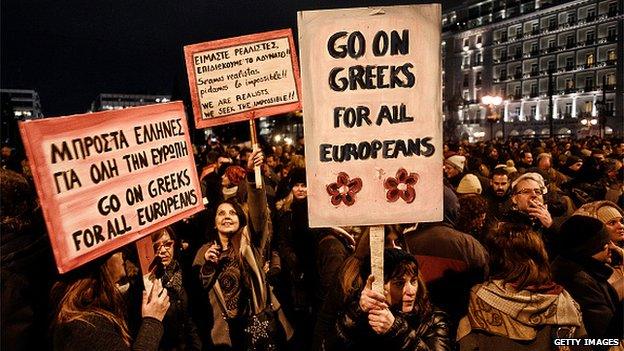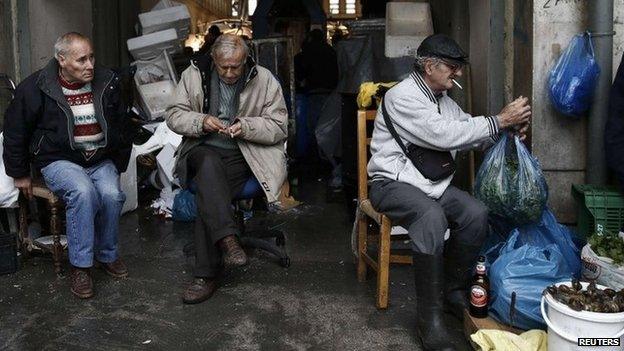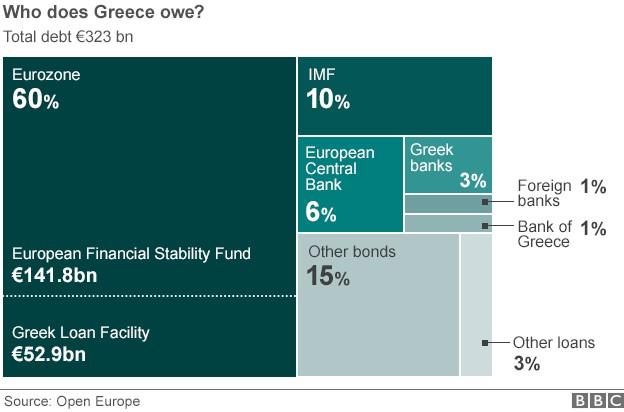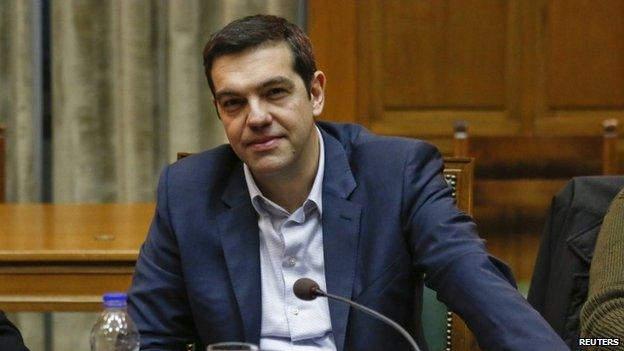Greece bailout: Government unveils reform summary
- Published

Greece is trying to balance the demands of creditors with those of austerity-weary voters
Greece has unveiled an outline summary of reforms demanded by eurozone leaders in order to secure a bailout extension.
The measures include plans to combat tax evasion and tackling fuel and tobacco smuggling.
Government officials said they were releasing the summary before formally submitting it to guard against leaks to the press.
The list must be approved by international creditors on Tuesday to secure a four-month loan extension.
Greece had previously delayed presenting the reforms by 24 hours after initially agreeing to deliver its proposals to creditors on Monday.
Analysts say the deal's collapse would revive fears Greece will exit the euro.
The summary released on Monday evening contains measures that had been widely anticipated.
It outlined proposals to trim the civil service and combat corruption.
In addition, it included a commitment to address what Syriza has called Greece's "humanitarian crisis".

Greek voters have experienced years of austerity
The far-left party has vowed to spend nearly 60m euros (£44m) on free electricity for the poor and more than 750m euros on a program of meal subsidies.
Such policies are aimed at fulfilling pre-election pledges to help those hit by years of economic crisis.
The main points of the summary of the proposals include:
Creating a fairer tax system
Combating tax evasion
Tackling corruption
Targeting fuel and tobacco smugglers
Implementing labour reforms on collective contracts and bargaining agreements.
Tackling Greece's "humanitarian crisis" with housing guarantees and free medical care for the uninsured unemployed.
Greece's creditors - the European Central Bank, the European Commission and the International Monetary Fund - are expected to deliver their verdict on the proposals later on Tuesday, before the reforms are discussed in a conference call with eurozone finance ministers.

Greece agreed an extension to its financial rescue programme with eurozone countries on Friday.
The four-month extension deal is widely regarded as a major climb-down for Prime Minister Alexis Tsipras, who won power in January vowing to reverse budget cuts.

In quotes:
"Europe has some breathing space, nothing more, and certainly not a resolution. The fundamentals - namely assistance in exchange for reform - must remain the same."
German Foreign Minister Frank-Walter Steinmeier (Bild newspaper)
"[On Friday] we took a decisive step, leaving austerity, the bailouts and the troika behind. We won a battle, not the war. The difficulties, the real difficulties... are ahead of us."
Greek Prime Minister Alexis Tsipras on Saturday
"Renaming the troika as 'institutions', the bailout as an 'agreement' and creditors as 'partners' [in Friday's deal] ... does not change the previous situation. I apologise to the Greek people because I took part in this illusion. Let's react before it is too late."
Veteran Greek activist and Syriza MEP Manolis Glezos criticises his party in a weekend blog
"The Eurozone either has to say yes Greece has a problem and yes we are going to help it in some way. That would be the pragmatic approach but unfortunately you also have a lot of dogma in there whereby they say that no you have to live below your means, you have to try to generate some kind of surplus in order to do that."
David Kuo, the Motley Fool global financial website

'Long road ahead'
A spokesman for the German finance ministry, Martin Jaeger, was quoted by Reuters news agency as saying that Berlin expected the Greek plan to be "coherent and plausible".
Greek Finance Minister Yanis Varoufakis has said the bailout agreement will be "dead" if the list of reforms his government is drafting is not approved.

The new Greek government, led by Prime Minister Tsipras, was elected by promising to reverse austerity
In effect, the deal has kicked down the road some of the more difficult issues, like the future sustainability of Greek debt, the BBC's Chris Morris reports from Brussels.
For now the focus is on steadying the ship, and trying to produce an interim plan, he adds.
On Friday, German Finance Minister Wolfgang Schaeuble stressed that there would be no payment of new funds to Greece until the conditions of the deal had been met.
Mr Tsipras said in a televised address the following day that his government had "won a battle, not the war".
He called the deal an "important negotiating success" but warned that there was a "long and difficult road ahead".

Greek economy in numbers

Unemployment is at 25%, with youth unemployment almost 50% (corresponding eurozone averages, external: 11.4% and 23%)
Economy has shrunk by 25% since the start of the eurozone crisis
Country's debt is 175% of GDP
Borrowed €240bn (£188bn) from the EU, the ECB and the IMF